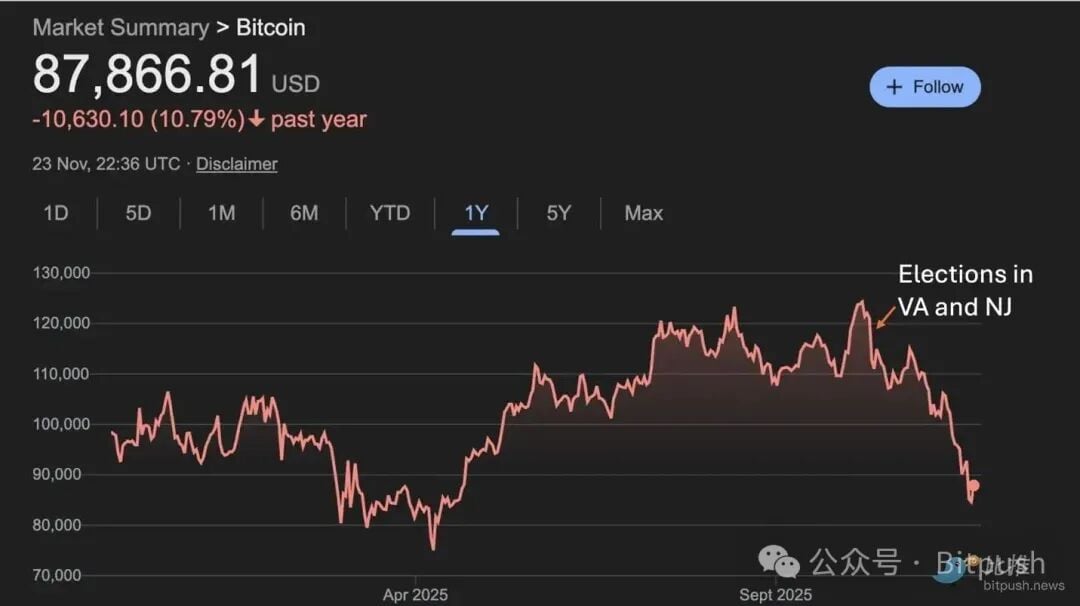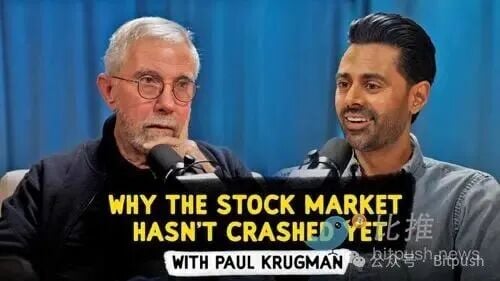Author: Paul Krugman
Original Title: The Trump Trade is Unraveling
Introduction
Paul Krugman, the 2008 Nobel Prize winner in Economics and a columnist for The New York Times, is known for his distinct Keynesian stance and sharp public policy analysis. He excels at transforming complex economic mechanisms into clear social insights and never shies away from controversial political assertions.
In his latest article on November 24, 2025, Paul Krugman presents a sharp viewpoint:
Bitcoin has evolved into a "Trump trade," its fate deeply intertwined with Trump's political influence. Therefore, the recent plunge in Bitcoin's value is, in his view, not an isolated market behavior but a direct reflection of the decline of Trump's political power and influence in the financial markets.

The following is the main text:
What is the actual use of Bitcoin? It is not a currency—meaning it is not a medium of exchange for payments.
It cannot hedge against inflation.
It also cannot hedge against financial risk—instead, Bitcoin prices typically move in tandem with the recent AI concept stocks driving the stock market, and with even greater volatility.

If there is a use case for Bitcoin, its core function lies in obscuring the flow of funds: cryptography facilitates anonymous transactions that leave no paper trail. These transactions are not necessarily illegal, but many of them are.
It is worth mentioning that anonymity not only fosters criminal activities among crypto users but also makes them easier targets for crime. As long as you hold the Bitcoin key—unlocking its code, regardless of who you are or how you obtained it, it belongs to you. In this sense, obtaining a Bitcoin key is akin to acquiring a bag full of hundred-dollar bills.
This characteristic has triggered a wave of kidnappings targeting large cryptocurrency investors, with criminals demanding victims hand over their keys.
In fact, such kidnappings have become so common that a recent major Bitcoin conference dedicated an entire day to a "anti-kidnapping" workshop, where participants learned skills like biting through restraints.
In addition to fostering crime, Bitcoin is increasingly becoming a tool for financial predation. Cryptocurrencies—worse yet, the stocks of companies that purchase cryptocurrencies with borrowed money—are heavily marketed to naive investors who are often unaware of the risks. They may profit when Bitcoin rises, but most likely do not understand the extent of the losses they will face when it crashes.
Recently, cryptocurrencies have indeed plummeted significantly. While Bitcoin has outperformed lesser-known altcoins, it has still dropped about 25% since late October.
Bitcoin may rebound, as it is not just an asset but a kind of faith.
When I spoke with Hasan Minhaj (a well-known American host and political commentator) about Bitcoin, he immediately responded to my criticism by saying, "I don’t want to be turned into a meme; Bitcoin believers are already targeting me."

This faith characteristic allows Bitcoin to recover from setbacks and scandals that would destroy ordinary investments, as loyal believers tend to double down in the face of price declines. This time may be no different.
But it could also be different—because Bitcoin has essentially devolved into a "Trump trade." After Trump's victory last year, Bitcoin prices soared, and the recent plunge coincides with a series of political setbacks for Trump.
Why is it called a Trump trade?
Part of the reason is that Trump, after his family effectively received large bribes from the crypto industry, is repaying the industry through pro-crypto policies.
Notably, he has signed an executive order allowing ordinary Americans to invest their 401(k) retirement funds in crypto assets—often without these investors being aware of the risks involved.
More broadly, as I mentioned, cryptography is increasingly becoming a tool for financial predation, and the Trump administration is extremely lenient towards such predatory behavior. They are working hard to dismantle the institutions established after the 2008 financial crisis to protect investors and market safety, such as the Consumer Financial Protection Bureau.
Treasury Secretary Scott Bentsen and other Trump administration officials and allies (including some Federal Reserve officials) are also tirelessly weakening bank regulations—regulations that were originally set up to limit the high-risk behaviors that led to the 2008 crisis.
All of this is detrimental to retail investors and financial stability, but beneficial to financial speculators like Bitcoin promoters.
So how should we interpret the recent plunge in Bitcoin? It can be seen as the unraveling of the "Trump trade." Although Trump is still striving to repay the industry that made his family wealthy, his power is clearly waning. Therefore, the price of Bitcoin, which has essentially become a bet on Trumpism, should fall in response.
Why has Trump suddenly shown signs of decline? Polls have consistently given him very low ratings since spring, but his net approval rating has significantly dropped in the past month.
Although he just claimed to have the "highest approval rating of his political career"—no one knows which poll he is referencing—his party's significant victories in Virginia and New Jersey on November 4 have completely eliminated doubts about his extremely unpopular poll results.
These electoral defeats have shaken the willingness of congressional Republicans to follow Trump closely. Meanwhile, the ongoing fallout from Trump's relationship with Jeffrey Epstein is eroding the MAGA base.
Many political analysts may not fully realize: a large number of supporters once firmly believed that Trump was protecting the world from the Democratic Party's pedophilia, and when they gradually come to realize they may have confused heroes with villains, the internal shock is profound.
Is it far-fetched to link Trump's political predicament with cryptocurrency prices? Not at all. As Josh Marshall often emphasizes—power has a unifying effect. A weakened Trump will see the effectiveness of his efforts across all fronts diminish, including those aimed at promoting the crypto industry.
I will delve deeper into the connection between politics and the crypto realm in future articles. For now, I just want to reiterate:
Bitcoin has become a Trump trade, and its price decline is an indicator of Trump's waning control over the Republican Party.
免责声明:本文章仅代表作者个人观点,不代表本平台的立场和观点。本文章仅供信息分享,不构成对任何人的任何投资建议。用户与作者之间的任何争议,与本平台无关。如网页中刊载的文章或图片涉及侵权,请提供相关的权利证明和身份证明发送邮件到support@aicoin.com,本平台相关工作人员将会进行核查。




